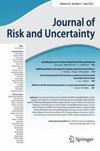The predictive power of risk elicitation tasks
IF 2.3
2区 经济学
Q3 BUSINESS, FINANCE
引用次数: 4
Abstract
Abstract This work reports the results of two online experiments with a general-population sample examining the performance of different tasks for the elicitation of risk attitudes. First, I compare the investment task of Gneezy and Potters (1997), the standard choice-list method of Holt and Laury (2002), and the multi-alternative procedure of Eckel and Grossman (2002) and evaluate their performance in terms of the number of correctly-predicted binary decisions in a set of out-of-sample lottery choices. There are limited differences between the tasks in this sense, and performance is modest. Second, I included three additional budget-choice tasks (selection of a lottery from a linear budget set) where optimal decisions should have been corner solutions, and find that a large majority of participants provided interior solutions instead, casting doubts on people’s understanding of tasks of this type. Finally, I investigate whether these two results depend on cognitive ability, numerical literacy, and education. While optimal choices in budget-choice tasks are related to numerical literacy and cognitive ability, the predictive performance of the risk-elicitation tasks is unaffected.

风险引出任务的预测能力
摘要:本研究报告了两个在线实验的结果,该实验以一般人群为样本,研究了不同任务的表现,以激发风险态度。首先,我比较了Gneezy和Potters(1997)的投资任务,Holt和Laury(2002)的标准选择列表方法,以及Eckel和Grossman(2002)的多选择程序,并根据一组样本外彩票选择中正确预测的二进制决策的数量来评估它们的表现。从这个意义上讲,任务之间的差异有限,性能也不高。其次,我加入了三个额外的预算选择任务(从线性预算集中选择彩票),其中最优决策应该是角落解决方案,并发现绝大多数参与者提供了内部解决方案,这使人们对这类任务的理解产生了怀疑。最后,我研究了这两个结果是否取决于认知能力、数字素养和教育。预算选择任务中的最优选择与数字素养和认知能力有关,而风险启发任务的预测性能不受影响。
本文章由计算机程序翻译,如有差异,请以英文原文为准。
求助全文
约1分钟内获得全文
求助全文
来源期刊

Journal of Risk and Uncertainty
Multiple-
CiteScore
6.30
自引率
10.60%
发文量
29
期刊介绍:
The Journal of Risk and Uncertainty (JRU) welcomes original empirical, experimental, and theoretical manuscripts dealing with the analysis of risk-bearing behavior and decision making under uncertainty. The topics covered in the journal include, but are not limited to, decision theory and the economics of uncertainty, experimental investigations of behavior under uncertainty, empirical studies of real world risk-taking behavior, behavioral models of choice under uncertainty, and risk and public policy. Review papers are welcome.
The JRU does not publish finance or behavioral finance research, game theory, note length work, or papers that treat Likert-type scales as having cardinal significance.
An important aim of the JRU is to encourage interdisciplinary communication and interaction between researchers in the area of risk and uncertainty. Authors are expected to provide introductory discussions which set forth the nature of their research and the interpretation and implications of their findings in a manner accessible to knowledgeable researchers in other disciplines.
Officially cited as: J Risk Uncertain
 求助内容:
求助内容: 应助结果提醒方式:
应助结果提醒方式:


